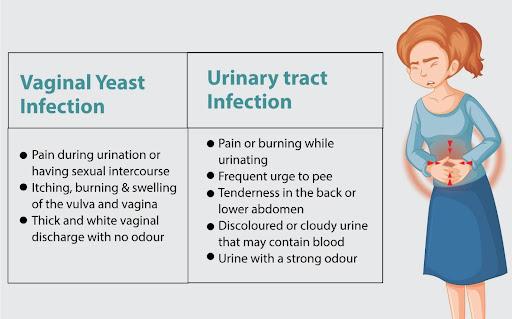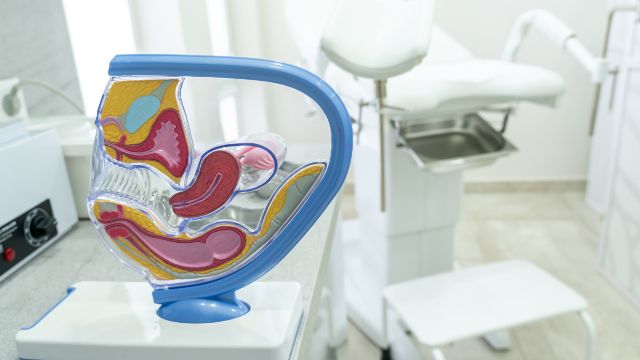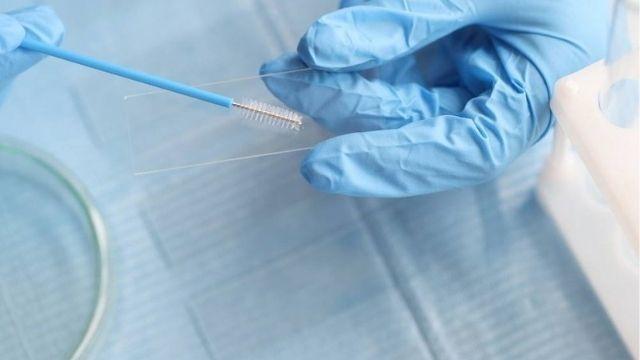Urinary and Vaginal Infections

Overview
Have you ever experienced pain or a burning sensation when you urinate? You may have a condition called urinary tract infection (UTI). This is a commonly found infection among women. Thankfully, you can easily take care of most UTIs. About 75% of women experience a vaginal and urinary infection at some point in their life, and up to 45% of them get repeated infections.
It is a quite daunting experience if you’ve had one before —it’s not something you want again. Fortunately, you can make lifestyle and diet changes to prevent these infections. So, here’s a look at urinary and vaginal infection and their treatment.
Everything You Need to Know About Urinary and Vaginal Infections
Urinary and Vaginal Infections | Risk Factors | Symptoms | Test To Check | Prevention | Treatment | Conclusion
What are Urinary and Vaginal Infections?
1. Urinary Tract Infections (UTI)
It is an infection of the kidneys, bladder and urethra that forms our urinary system. UTIs are mostly caused by bacteria that often come from the rectal area or digestive tract.
The gold standard method for treating UTIs includes taking antibiotics for at least 3 days.If your UTI is sexually transmitted, your partner would need to be treated, too. If you get recurrent or repeated infections, your physician may refer you to a specialist.
2. Vaginal Infections
Vaginal infection or vaginitis can cause irritation, discharge, and pain during urination and sex. Here are the most common type of vaginal infections:
- Vaginal yeast infection also known as vaginal candidiasis, is caused by an overgrowth of fungus or yeast.
Vaginal yeast infections may be caused by:
-
- Stress, sickness, pregnancy, and other circumstances that may impact your immune system, making you prone to yeast infections.
- Hormones, antibiotics, and contraceptive pills.
- Hyperglycemic state (such as with poorly managed diabetes).
- Keep the vaginal region moist by constantly wearing undergarments and trousers.
- Bacterial vaginosis is caused by an overgrowth of certain bacteria that are naturally found in the vagina.
- Trichomoniasis is a sexually transmitted infection caused by a parasite.
Women with trichomoniasis have a foul-smelling vaginal discharge, painful urination and genital itching.
These infections are more common in women than men. Urinary tract infections that affect the bladder have fewer complications. However, if a UTI develops in your kidneys, it may have significant repercussions.
A doctor usually prescribes an antibiotic to cure these infections. You may, however, take preventative measures to lower your risk of developing UTIs.
Sub Treatments For Gynecology
We are one of the Best IVF Clinic in Delhi NCR!
51.8K
Subscribers
4.6 (383 reviews)
4.5 (409 reviews)
3.5 (254 reviews)

5 Out Of 5
Risk factors of urinary and vaginal infections
- Sexual intercourse
- Use of contraceptive methods and devices, like diaphragms or spermicide.
- Wiping from back to front after a bowel movement causes contact with bacteria-laden feces.
- Having bladder or kidney stones.
- Urinating without emptying the bladder completely.
- Using a urinary catheter
Symptoms of Urinary and Vaginal Infections
Discomfort and pain in the genital region usually indicates a urinary tract infection or a yeast infection. Although both infections have the same prevention methods, their symptoms differ.

In males, signs of a urinary tract infection:
The signs and signs of a higher urinary tract infection in males are quite similar to those in a female. Men with such a lower tract UTI, on the other hand, may suffer rectal discomfort on occasion.
Test to check for UTIs and Vaginal infection:
Urine examination helps in detecting infection in urine while and vaginal swab test can be used to detect vaginal infection.
Prevention of UTIs and vaginal yeast infections
Here are some tips to prevent UTIs and yeast infections:
- Stay hydrated
- Urinating only when the need arises and not holding for a long time
- Wiping only from front to back after a bowel movement
- Urinating before and after sex
- Avoid the use of vaginal sprays, and scented vaginal hygiene products
- Regularly changing female sanitary products
- Avoid tight-fitting clothing
Treatment of Urinary and Vaginal Infection
A hygienic lifestyle may help prevent or treat Urinary and Vaginal Infections. For example, when it’s hot outside, or you’ve been sweating a lot, it’s very important to take frequent showers and wash/change your clothing often.
- Candidiasis or yeast infection is usually treatable with antifungal lotions applied directly to the skin. These creams may be purchased over-the-counter (OTC). Butoconazole, miconazole, clotrimazole, and terconazole are just a few of the numerous names they go by. For example, Nystatin, oral fluconazole, or Lamisil may be needed for long-term infections.
- Vaginal suppositories and creams may be used to treat most vaginal infections. Oral antibiotics like fluconazole and ketoconazole may assist with a persistent infection. If you have recurring vaginal infections, you may need to switch to a different kind of birth control.
- Uncircumcised males might have to undergo circumcision if the inflammation of the tip of the penis does not respond to lotions on the skin.
- If you are using a urinary catheter, removing or replacing a catheter regularly may help treat a urinary illness. In 60% of individuals, cleaning the bladder with amphotericin B or systemic medicine will be effective.
- Stay hydrated
- Urinating only when the need arises and not holding for a long time
- Wiping only from front to back after a bowel movement
- Urinating before and after sex
- Avoid the use of vaginal sprays, and scented vaginal hygiene products
- Regularly changing female sanitary products
- Avoid tight-fitting clothing
Conclusion
It is not uncommon for people to suffer from a urinary tract infection. Infection in genital areas, including the bladder, ureters, urethra, or kidneys, is common. Bacteria are the most prevalent culprits, although viruses and fungi may also play a role.
Therefore, getting an accurate diagnosis for a UTI is essential if you believe you have one. If this infection is left untreated, it can progress, causing additional complications like an untreated UTI may cause a severe kidney infection. Hence, early diagnosis and treatment are essential when it comes to these types of infections.
Reach out to us, if you have any queries related to the urinary tract and vaginal infections.
Our Expert Team
Dr. Gunjan Gupta Govil
Founder & Director
Founder, Director & Gynaecologist with specialization in IVF, Infertility & Laparoscopy of 20+ years of experience.
(20+ years of experience)

Dr. Pradyot Kumar
Founder, CEO and a specialized Neurosurgeon who is an expert in complex Brain and Spine surgeries.
(25+ years of experience)

Mr. Gaurav Singhai
COO and an entrepreneur who co-founded Gujan IVF world along with Dr Gunjan and Dr Pradyot.
(5+ years of experience)

Paritosh Sarkar
Embryologist
He is a highly experienced and successful Embryologist with more than 10 years of experience in IVF.
(10+ years of experience)
Patient Guide
Along with treating our patients, we also guide them with the help of our educational blogs and videos.
Educational Blogs

Why do blastocyst not implant?
The reasons for an unsuccessful implantation are very uncommon and rare as well. Blastocyst provides a greater chance of becoming pregnant therefore the procedure is handled properly as well.

What happens after blastocyst transfer?
Before jumping to the immediate question first let’s have a small brief of what is blastocyst transfer. Blastocyst transfer is the transfer of embryos that have achieved a higher stage of development.

Can blastocyst fall out?
Maximum patients worry about what they can do or cannot do after an embryo transfer. They have the fear that if they do something wrong, the embryo would not attach or fall out.
Educational Videos

What is TORCH test in infertility and why is it done?
There are numerous tests that are available to infertile couples that are recommended by some doctors, which might help them determine the cause of their infertility. One such test is the TORCH test.

What is Prolactin Hormone?
Prolactin is a hormone produced by the pituitary gland present at the brain’s base. It is best known for its role in lactation, or milk production, in breastfeeding women.However, Prolactin also plays other important roles in both men and women, such as regulating the immune system, stimulating the growth of new blood vessels, and influencing behaviour and reproductive function. In this blog, we will explore what Prolactin is, how it works, and what happens when there are imbalances in prolactin levels.

Frequently Asked Questions about Low AMH
Primordial and Preantral follicles produce AMH. So the AMH level indicates the number of eggs or egg reserves you have in your ovary. Putting simply, if your AMH level is low, then the number of eggs in your ovary is less.
Frequently Asked Questions
Does testicular temperature have an impact on male fertility
IVF specialists of the best IVF centre in Ghaziabad – Gunjan IVF World share an informative blog on one of the most ignored factors of male infertility. It is an alarming fact to...
Is male menopause a myth or reality ?
IVF specialists of the best IVF centre in Ghaziabad – Gunjan IVF World debunk the myths about male menopause through this informative blog Menopause as a term is extremely common...
Can smoking cause fertility problems in men?
IVF specialists of the best IVF centre in Ghaziabad – Gunjan IVF World share valuable insights on how smoking leads to infertility in men. Becoming parents is one of the greatest...














